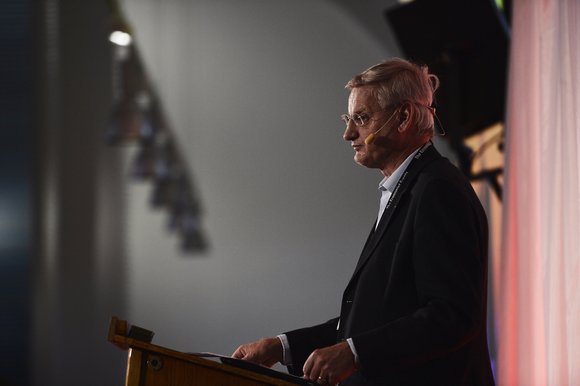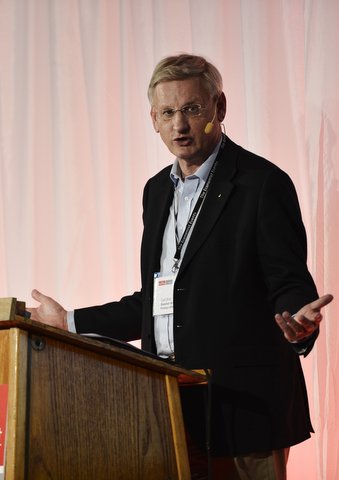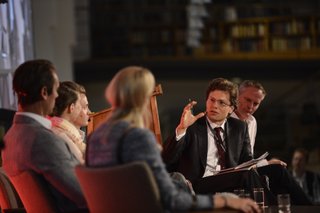Grappling with digitalisation
Events
Swedish Foreign Minister Carl Bildt weighed in on the challenges of global digitalisation June 13 at KTH, calling “freedom on the net” the most important front in the struggle for freedom worldwide.

The Swedish Foreign Minister, Carl Bildt, joined dozens of leading innovators, researchers, entrepreneurs, futurists and policymakers at KTH Royal Institute of Technology in Stockholm on June 13 for Digital Horizons, a day of presentations and panel discussions on the threats and opportunities of the next wave of digitalisation.
The conference, organised and sponsored by The Economist magazine, culminated with a speech by Bildt, who addressed internet freedom as well as the “threats and vulnerabilities of societies in an increasingly hyper-connected world.”
While issues of cyber security and privacy have become increasingly difficult, the former prime minister said that digitalisation also has potential to enable “open and dynamic democracy.
“It goes far beyond the average politician commenting on Twitter – I think it is a truly revolutionary change,” Bildt said. “We see mechanisms for accountability, which enhances trust in the political system, gives voice to citizens and it does empower people.”

Bildt called for multi-lateral engagement among public and private entities to balance the needs for cyber security and internet freedom, while stressing the fundamental values enshrined in the UN’s Resolution 20/8 on internet access and human rights. “I think (the resolution) has transformed the political conversation around these issues in a way that we had hoped for. And it has acquired a symbolic significance well beyond what resolutions coming out of that particular – or other – UN bodies normally have. And it is our platform for the continued fight for freedom on the net, which is, I think, the most important of front lines in the fight for freedom around the world.”
Some of the highlights from the event:
Job development
The European Union foresees a shortage of workers with ICT qualifications for some 900,000 jobs by 2015. ICT skills are becoming an increasingly critical part of a multitude of disciplines, and competition for jobs will demand constant education, says Jan Gulliksen, Professor of Human Computer Interaction at KTH. Gulliksen, who is Sweden’s Digital Champion says: “There will be a requirement for mobility in the labor force. You will need to switch jobs more often and press your skill more to cope with new jobs and that will place a high requirement on the lifelong education system.” And if the average lifespan extends, as some predict, to 150 years, Gulliksen says people can expect more than a few careers changes before reaching the 100-year retirement age.
A critical moment
The mention of cyber wars calls to mind conflicts between nations, but today the corporations that dominate the digital domain are creating what author Jeremy Silver describes as “feudal city states”, and we’re the becoming the helpless peasants who inhabit them as they do battle. Vertical integration of the big web services is already creating walled gardens, Silver says. And while that might present seemingly unimpressive problems such as not being able to move your music from one cloud to another, things could get worse. “Moving your health record from one cloud to another may significantly affect you,” he says by way of example. Not to mention the creepiness of retailers being able to figure out when their customers are pregnant several months before they’ve even given birth. “We are at a critical moment, I think it’s a moment that governments are finding it difficult to respond to,” he says. “It’s quite possible for companies to behave responsibly and ethically. If we don’t understand the deal we make with the Facebook or Google or another company … then we are very vulnerable, and that’s something that governments and policy makers can do something about.”
No longer just collecting data, but sensing it

Nicklas Lundblad, Director of Public Policy and Governmental Relations with Google, described the ways that data is changing. “We’ve gone from collecting data to sensing. We are undergoing a sensor explosion. In the Spanish city of Santander, they have built in sensors for everything, they sense noise, parking pollution, temperature … Essentially, what we are doing is building the basic human senses into a city.”
Prognosis for e-health may depend on users' desire for information
Technology is sometimes viewed as a threat to the medical profession, and the health industry remains for the most part not-networked; but to some extent the growth of digital health is being driven by consumers themselves in the form of fitness devices. As IBM Healthcare’s John Crawford points out, patients themselves are more likely than a doctor to determine their own health outlook. The lifestyle and behavior choices they make are based on what information they have, but what if they have more information, in real time? The health care system may take longer to embrace digitalisation than consmers. “But it will happen and it has to happen. If you look at the system today, it’s unsustainable,” Crawford says.
David Callahan

